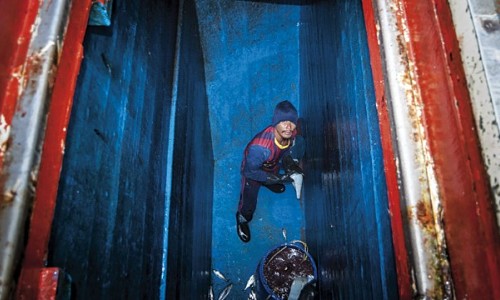Thailand’s Fishing Industry Linked to Slavery

Thailand, one of the two countries down-graded last month on the U.S. human trafficking watch list has failed at protecting the population from being forced into slavery. As officials turn the other cheek, boys and men are trapped in a nightmare, laboring miserably on decrepit fishing vessels for prawns sold to British and American supermarkets.
The U..S Department of State Trafficking in Persons Report (TiP), which evaluates countries based on their success in combating the activities of traffickers in their jurisdiction, down-graded Thailand from Tier 2 to Tier 3, the worst possible rating, focusing the world’s attention on their lack of effort in fighting slavery.
According to an investigation conducted by The Guardian, the extensive role played by Thai authorities, fishermen and traffickers has been uncovered with the imprisonment of thousands of Rohingya in illegal, deadly jungle camps.
The Rohingya are Indo-Aryan peoples from the Rakhine State, Myanmar, who speak the Rohingya language. In recent years, Myanmar has been accused of human rights violations and ethnic cleansing instigated by the ethnic Rakhine Buddhist, victimizing the stateless Muslim Rohingya through looting, arson, evictions and outright cold-blooded murder. For many Rohingya the choice was simple: stay and die, or leave by boat.
The Rohingya attempting to escape the violence have no option but to flee to the seas, seeking passage by boat down the coast of Thailand to relative safety in Malaysia, but in many cases, these refugees were intercepted and sold like animals into slavery on the Thai fishing boats. Often victims were escorted into jungle camps by Thai authorities where they were held in transit.
The Thai fishing industry is a multibillion-dollar business estimated at $7.3 billion a year. The slavery trade hidden behind the frozen shrimp packages on the shelves of Tesco, Walmart, Carrefour and Costco stores is so profitable that many fishermen in Thailand have converted their ships to carry Rohingya migrants instead of fish, increasing profits in some cases by 230%.
According to The Guardian, testimony from survivors, brokers and human rights groups have indicated that hundreds of Rohingya men were sold from a network of jungle slavery camps in southern Thailand. Rohingya migrants actually sold from these camps said operations were conducted in full awareness of government officials, and, in many cases, they were directly involved.
The Guardian reported that the jungle camps were often open-air prisons in which Rohingya captives were held for ransom, their captors demanding money far out of reach of their families. Survivors described being raped and tortured as well as witnessing others beaten to death.
In May 2015, Thai and Malaysian investigators discovered several jungle prisons and mass graves used as holding pens for trafficking operations.
Thailand is facing unprecedented pressure from the global community. The European Union gave Thailand six months to crack down on illegal fishing and labor abuses or face a trade ban, which could result in Thailand losing up to €1 billion ($1.1 billion) a year in seafood exports.
In the wake of Thailand’s drop on the human trafficking watch list, Thailand seems to be attempting to fight the human atrocities poisoning the country and has announced tougher legislation to address trafficking. However, according to Melysa Sperber, director of the Alliance to End Slavery and Trafficking, little has been seen, and no evidence of real improvement has been realized.
– Jason Zimmerman
Sources: MSN, The Guardian 1, The Guardian 2
Photo: CNN
